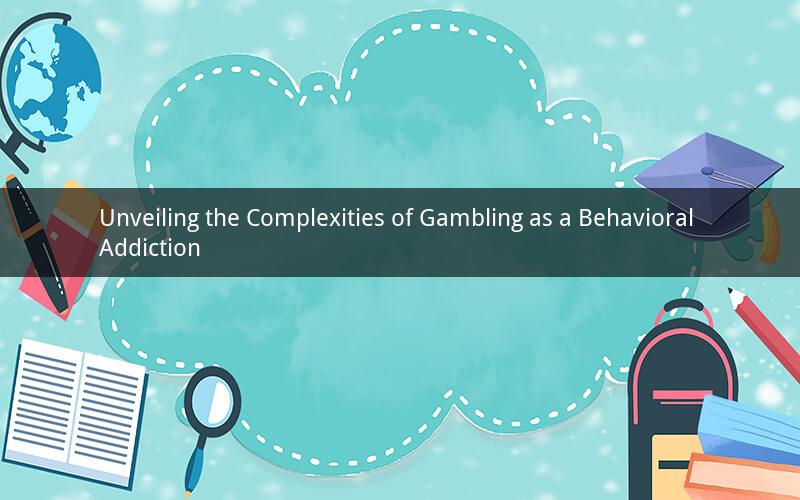
Introduction:
Gambling has been a topic of intense debate and discussion over the years. While many view it as a form of entertainment, others argue that it can be classified as a behavioral addiction. This article delves into the intricacies of gambling as a behavioral addiction, exploring its causes, effects, and the ongoing debate surrounding its classification.
I. Understanding Behavioral Addiction
Behavioral addiction, also known as process addiction, refers to the compulsive engagement in a behavior that is rewarding in the short term but harmful in the long run. Unlike substance addiction, behavioral addictions do not involve the consumption of drugs or alcohol. Instead, they involve activities such as gambling, shopping, or gaming.
II. Causes of Gambling Addiction
Several factors contribute to the development of gambling addiction. These include:
1. Genetic predisposition: Research suggests that genetics play a role in the likelihood of developing a gambling addiction. Individuals with a family history of addiction or mental health issues may be more susceptible.
2. Environmental factors: The availability of gambling opportunities, exposure to gambling-related media, and the presence of a supportive gambling culture can contribute to the development of an addiction.
3. Psychological factors: Individuals who seek excitement, thrill, or a sense of control may be more prone to developing a gambling addiction. Additionally, those with low self-esteem or a history of trauma may turn to gambling as a form of self-medication.
III. Effects of Gambling Addiction
Gambling addiction can have severe consequences on an individual's life, including:
1. Financial difficulties: Compulsive gamblers often experience significant financial losses, leading to debt, bankruptcy, and strained relationships with family and friends.
2. Mental health issues: Gambling addiction can exacerbate mental health conditions such as depression, anxiety, and substance abuse disorders.
3. Social and family problems: The stress and strain of gambling addiction can lead to strained relationships, job loss, and even homelessness.
IV. The Debate Over Classification
The classification of gambling as a behavioral addiction has sparked a heated debate among researchers, clinicians, and policymakers. Some argue that gambling should be recognized as a behavioral addiction due to its similar characteristics to substance addiction, such as:
1. Loss of control: Compulsive gamblers often struggle to control their gambling behavior, despite the negative consequences.
2. Preoccupation: Individuals with a gambling addiction may constantly think about gambling, planning their next betting session, or reliving past gambling experiences.
3. Relapse: Just like substance addiction, gambling addiction can lead to relapse, even after periods of abstinence.
However, others argue that gambling should not be classified as a behavioral addiction due to its unique characteristics, such as the potential for winning money. This distinction has implications for treatment approaches, insurance coverage, and public policy.
V. Treatment and Support
Recognizing gambling as a behavioral addiction can help individuals seeking treatment. Treatment options may include:
1. Cognitive-behavioral therapy (CBT): CBT helps individuals identify and change the negative thought patterns that contribute to their gambling addiction.
2. Support groups: Joining a support group, such as Gamblers Anonymous, can provide individuals with a sense of community and support.
3. Medication: In some cases, medication may be prescribed to help manage symptoms of depression or anxiety associated with gambling addiction.
VI. Conclusion
The classification of gambling as a behavioral addiction is a complex issue that requires further research and discussion. Regardless of its classification, it is crucial to recognize the harmful effects of gambling addiction and provide appropriate support and treatment to those affected. By understanding the causes, effects, and treatment options, we can work towards a more informed and compassionate approach to addressing this pressing issue.
Questions and Answers:
1. What are the main factors that contribute to the development of a gambling addiction?
Answer: The main factors include genetic predisposition, environmental factors such as the availability of gambling opportunities, and psychological factors such as seeking excitement or relief from stress.
2. How can gambling addiction affect an individual's financial stability?
Answer: Gambling addiction can lead to significant financial losses, resulting in debt, bankruptcy, and strained relationships with family and friends.
3. What are some common treatment approaches for gambling addiction?
Answer: Common treatment approaches include cognitive-behavioral therapy (CBT), support groups such as Gamblers Anonymous, and medication to manage symptoms of co-occurring mental health issues.
4. Why is the classification of gambling as a behavioral addiction important?
Answer: The classification is important because it helps raise awareness about the harmful effects of gambling addiction, promotes appropriate treatment approaches, and influences public policy and insurance coverage.
5. Can a person recover from a gambling addiction?
Answer: Yes, recovery from a gambling addiction is possible. With proper treatment, support, and a commitment to change, individuals can overcome their addiction and lead a fulfilling life.